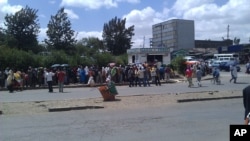Ethiopia has been dealt a double setback with word that inflation is rising rapidly at a time when drought is threatening crops and adding to the numbers of people needing food aid.
Ethiopia’s Central Statistical Agency Friday announced the consumer price index was 25 percent higher in March than a year ago. That follows a 16.5 percent increase in February.
The agency’s monthly report said the rolling 12-month average inflation rate had jumped to 11.3 percent in March. The food inflation rate stood at 5.8 percent. Deputy Director Ysin Mosa said the March figures were the highest since October, 2009.
The rise in food prices comes despite ceilings set by the government on several essential commodities in January, as protests over price increases triggered unrest in North Africa. Ethiopia’s price ceilings led to shortages in the market, prompting the government to bypass the market and take over the sale of cooking oil and sugar.
Economists say Ethiopia’s overall inflation rate is expected to jump again in April, reflecting a 14 percent hike in gasoline prices a few days ago.
On another front, the country’s disaster relief agency this week revised its estimate of the number of Ethiopians in need of food assistance. Earlier this year the agency asked international donors for help in feeding 2.8 million people suffering from malnutrition.
In a telephone interview, Agency director Tadesse Bekele said the figure has been revised upward to 3.2 million in light of the severe drought gripping the southern and southeastern parts of the country.
"We have prepared a national response plan for the southern and southeastern part of the country to enable our partners to intervene on the requirements we have set," Bekele said. "So basically this will by and large be [nutrition], on animal feeding, and child health as well, so we want partners to intervene in these area."
A World Food Program (WFP) report issued Friday tells of a "rapid increase in the magnitude" of water shortages threatening livestock in pastoralist areas of southern Ethiopia. The report says there is a high danger of conflict between pastoralists over scarce grazing land.
WFP spokeswoman in Addis Ababa, Susannah Nicol, says shipments of water and cattle feed have not been enough to prevent the deaths of the animals that are at the heart of the region’s economy.
"Shortages of water and pasture in particular have become critical in most areas," she said. "Of course the knock on effect of that will be that people’s livelihood are affected and indeed their ability to feed themselves."
Ethiopia’s troubles come as the World Bank is releasing figures showing a 36 percent rise in global food prices over the past year. Bank President Robert Zoellick this week warned "we are at a tipping point."
The United States, according to U.N. figures, is the largest single donor of food aid worldwide. The latest World Food Program report indicates U.S. food assistance to Ethiopia in the first three months of this year totaled more than $58 million.
Inflation, Drought Deal Ethiopia a Double Blow




